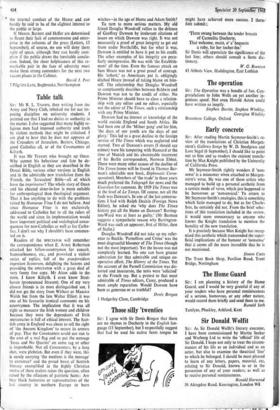Table talk
Sir : Mr R. L. Travers, then writing from the Army and Navy Club, rebuked me for not im- posing discipline on university students. I pointed out that I had no duties or authority in the matter. I also suggested that many highly re- ligious men had imposed authority and truth by violent methods that might be criticised. I am glad to hear that he does not approve of the Crusaders of Jerusalem, Beziers, Chicago, good Catholics all, or of the Covenanters of Kilsyth.
It was Mr Travers who brought up Onan. Why cannot his behaviour and fate be de- scribed in English as they are described in the Douai Bible, various other versions in English and in the admirable new translation from the French, the `Jerusalem' Bible all of which have the imprimatur? The whole story of Onan and his cheated sister-in-law is more suitable for anthropological than theological argument. That it has anything to do with the problems raised by Humanae Vitae I do not believe. And since Humanae Vitae is not exclusively addressed to Catholics but to all the rulers of the world and since its implementation would have important political and sociological conse- quences for non-Catholics as well as for Catho- lics, I don't see why I shouldn't have commen- ted on it.
Readers of the SPECTATOR will remember the correspondence when E. Arnot Robertson attacked her fellow-countrymen for conceit, humourlessness, etc., and provoked a violent series of replies, full of the praefervidtun ingenium Scotorum, delighting the Saxons and providing the SPECTATOR with a great deal of very funny free copy. Mr Aiton adds to the store. I know Kilsyth. I even know Strat- haven (pronounced Straven). One of my very closest friends is its most distinguished son. I did not get the story from Wishart or Maurice Walsh but from the late Walter Elliot; it was one of his favourite ironical comments on his countrymen. The implication that it was all right to massacre the Irish women and children because they were the dependants of Irish mercenaries is full of ethical interest. The Scot- tish army in England was about to sell the right of 'the Ancient Kingdom' to secure its arrears of pay. That the Covenanters could not run to the cost of a real flag and so put the message `Jesus and No Quarter' on some rag or other is improbable. Not all Covenanters, by a long shot, were plebeian. But even if they were, this is surely carrying 'the medium is the message' to extremes? and the proud boast of Scottish literacy exemplified in the highly Christian motto of these zealots raises the question, often raised by the effusions of patriotic Scots : Are they black humorists or representatives of the last country in northern Europe to burn witches—in the age of Hume and Adam Smith?
To turn to more serious matters. My old friend Douglas Woodruff rallies to the defence of Geoffrey Dawson by irrelevant citations of issues on which Dawson was right. It was not necessarily a proof of great integrity to get out from under Northcliffe, but for what it was, Dawson is entitled to have it put to his credit. The other examples of his integrity are pecu- liarly unimpressive. He was with 'the Establish- ment' all the time. Even the famous attack on Sam Hoare was not a great proof of courage. His `cohort,' as Americans put it, obligingly ditched Hoare instead of taking blame on him- self. The relationship that Douglas Woodruff so complacently describes between Baldwin and Dawson was not to the credit of either. No Prime Minister should have so close a relation- ship with any editor and no editor, especially not the editor of The Times, such a relationship with any Prime Minister.
Dawson had no interest or knowledge of the world outside England and South Africa. He had been one of the 'Milner gang' and for him, `the days of our youth are the days of our glory: This led to a great decline in the foreign service of The Times which was neglected and starved. Two of Dawson's errors (I should say crimes) were his tampering with Hansard at the time of Munich and his abominable treatment of his Berlin correspondent, Norman Ebbut. There were many other causes of the decline of The Times (some will be found in Thomas Bar- man's admirable new book, Diplomatic Corre- spondent). Members of `the trade' in those years much preferred the Telegraph for news and the Guardian for comment. By 1939 The Times was at the level of Le Temps. Of course, not all the fault was Davison's. In one of the last conversa- tions I had with Ralph Deakin (Foreign News Editor), he asked the 'why does The Times history put all the blame on Dawson? Barring- ton-Ward was at least as guilty.' (Mr Barman suggests a sympathetic reason why Barrington- Ward was such an appeaser, first of Hitler, then of Stalin.) Douglas Woodruff did not take up my refer- ence to Buckle. Parnellism and Crime' was the most disgraceful bloomer of The Times (though not the most important). Yet the lesson was not completely learned. No one can have greater admiration for that admirable and unique co- operative effort, The History of the Times. Yet the account of the Parnell Commission was dis- torted and inaccurate, the texts were `solicited' as the French say. But a protest to that most admirable of Times editors, Casey, produced a most. ample reparation. Would Dawson have been as generous or as truthful?










































 Previous page
Previous page